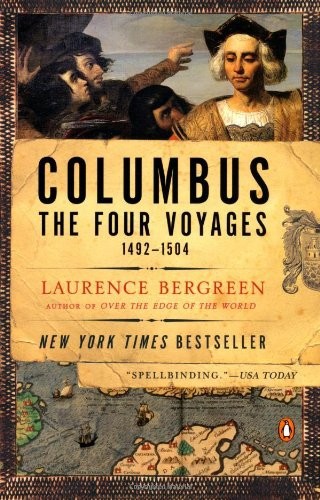
Columbus
The Four Voyages
کتاب های مرتبط
- اطلاعات
- نقد و بررسی
- دیدگاه کاربران
نقد و بررسی

August 8, 2011
Columbus’s first voyage to the New World was one of the formative events of human history. But who was Christopher Columbus? Renowned historian and biographer Bergreen (Marco Polo) seeks to illuminate the complex motivations and historical circumstances that shaped the explorer’s life, and the inquisitive, stubborn, and supremely self-assured nature that led him to sail to the end of the world and beyond. Focusing on the lesser-known events of Columbus’s three later voyages and his disastrous, near-genocidal rule in Hispaniola, Bergreen’s captivating narrative reveals a man obsessed to the point of delusion with acquiring gold and sending it back to Spain, perpetually unsure whether he should convert, enslave, or annihilate the natives he encountered, and dismissive of the continent he discovered, forever hoping to escape America and find a quick passage to the riches of China and India just beyond the next wave. His last voyage ended in a shipwreck, and Columbus died in 1503 disgraced, exhausted, and demoralized, although the toll of his voyages was surely felt more keenly by the oppressed Caribs and Taínos than by the admiral himself. While sensationalist and lacking in scholarly rigor, Bergreen’s biography makes good use of the firsthand accounts of Columbus’s contemporaries, rendering a dramatic story that will appeal to general readership. 7 maps.

August 15, 2011
Christopher Columbus—heroic explorer or genocidal plunderer? Bergreen (Marco Polo: From Venice to Xanadu, 2008, etc.) says he was both, and more.
While best known for his breakthrough voyage to the Caribbean in 1492, Columbus returned to the New World three times, discovering hundreds of islands, establishing settlements in Hispaniola and exploring the coasts of modern Venezuela and Central America. Like Patrick O'Brian's Jack Aubrey, he was a master at sea, a disaster on land. Ill-qualified for colonial administration, his attempts to turn a profit by accumulating gold and slaves, assisted by an unruly band of Spanish mariners and criminals, resulted in political back-biting that sent him back to Spain in chains at the end of his third voyage. The story of Columbus' exploits includes storms and shipwrecks, military clashes, political skullduggery, mutiny, cannibalism and promiscuous sex, but Bergreen fails to assemble the dramatic facts at his disposal into a compelling narrative. Nor does he deliver the measured evaluation of the man and his career that a controversial figure of his importance merits. Bergreen clearly doesn't like his subject much, and he interjects his own criticisms of the explorer throughout the text without specifying the standards by which he is judging his subject or the facts supporting his judgments. He even frequently reminds readers that, as every schoolchild knows, poor deluded Columbus was never anywhere near China or India. The author thereby becomes an intrusive figure in the narrative, while Columbus never emerges as the powerful, complex and charismatic personality he must have been. Furthermore, the text exhibits a confusing lack of discipline and order. For example, more than once Bergreen relates the same incidents or circumstances twice with varying details and no recognition that this ground has already been covered. As a result, readers will have difficulty trusting the sequence of events as presented.
A well-researched but disappointingly delivered biography of a monumental figure.
(COPYRIGHT (2011) KIRKUS REVIEWS/NIELSEN BUSINESS MEDIA, INC. ALL RIGHTS RESERVED.)

May 1, 2011
After encountering the Americas in 1492, Columbus made three more voyages, aimed at showing that he could whip together a crew bound for China and get the heathens there converted. Those voyages failed in many ways but demonstrated that Columbus was a skilled, gutsy sailor. Having assayed other bold explorers (Over the Edge of the World: Magellan's Terrifying Circumnavigation of the Globe has sold 200,000 copies), Bergreen seems like the right man to bring us up to speed on Columbus. Officially publishing on Columbus Day, though it's on sale beforehand, this seems like good, serious reading. With a six-city tour.
Copyright 2011 Library Journal, LLC Used with permission.

September 1, 2011
After 500 years, laymen and even historians find it difficult to remain neutral while describing the personality, achievements, and legacy of Columbus. He was a visionary and a confused bumbler. He fostered the meeting of two worlds, and he promoted slavery and genocide. He was willing to challenge accepted orthodoxies, and he was a narrow-minded religious fanatic. In this scrupulously fair and often thrilling account of of his four voyages to the New World, Bergreen reveals Columbus as brilliant, brave, adventurous, and deeply flawed. This is more than a personality study, and Bergreen illustrates the character of Columbus through his actions, avoiding facile attempts to analyze deep psychological motivations. The voyages, especially the last two, are the stuff of great adventure, and Bergreen effectively conveys the sense of wonder, danger, and exhilaration that accompanies voyages of discovery. He also portrays the slow personal deterioration of Columbus as he became increasingly rigid, frustrated, and prone to delusion. A superb reexamination of the character and career of a still controversial historical giant.(Reprinted with permission of Booklist, copyright 2011, American Library Association.)

























دیدگاه کاربران